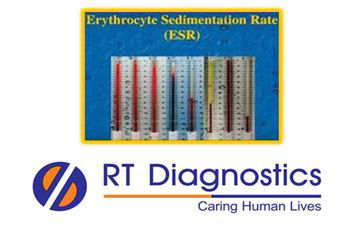ESR (Erythrocyte sedimentation rate):
Erythrocyte Sedimentation Rate (ESR) used to measure the time taken for Red blood cells (RBC) to sediment at the bottom of the sample tube. If this rate deviates from the normal time, that indicates an inflammatory disorder such as Arthritis, Vasculitis, and other immunity.
CLINICAL INFORMATION:
This test is done not to diagnose one specific condition. It may be done depending upon the symptoms of the patients as in conditions with signs of inflammation or infection. This test is suggested for patients who follow activity levels of conditions such as auto-immune diseases like SLE, rheumatoid arthritis, cancers, infections, inflammatory bowel disease, abnormal weight loss, diarrhea, fever, blood in the stool, or unusual abdominal pain, etc. ESR test may also be used to monitor treatment as to how well the treatment for inflammation or infection is working. ESR is also ordered along with the C-reactive protein (CRP) test because the CRP test also measures inflammation but also predicts risk for coronary heart disease and other cardiovascular diseases. Other associated tests include microhematocrit (Wintrobes method), microhematocrit, electric method, indirect method, etc.

General instructions:
Sample Requirement: Specimen - Blood sample drawn from the vein. Test Preparation: none
NOTE - Sample for specimen collections may vary based on the patient’s condition/cases according to the patient’s presenting complaints/signs or symptoms:
SPECIMEN REQUIREMENT (Special or Rare Cases) - As instructed and guided by Physician / Clinician / Pathologist / as per Laboratory’s requirements, according to procedures and protocols.
This Multi-Specialty Clinical Referral Laboratory “RTDIAGNOSTICS” provides precise and accurate tests with an extensive range of testing services to the medical centers to help in the diagnosis and identification of pathology in the test specimens for infectious diseases and also to evaluate the function of organ systems of the patient. It prevents further complications and helps to stabilize and restore health to near normalcy at the earliest without delay.



